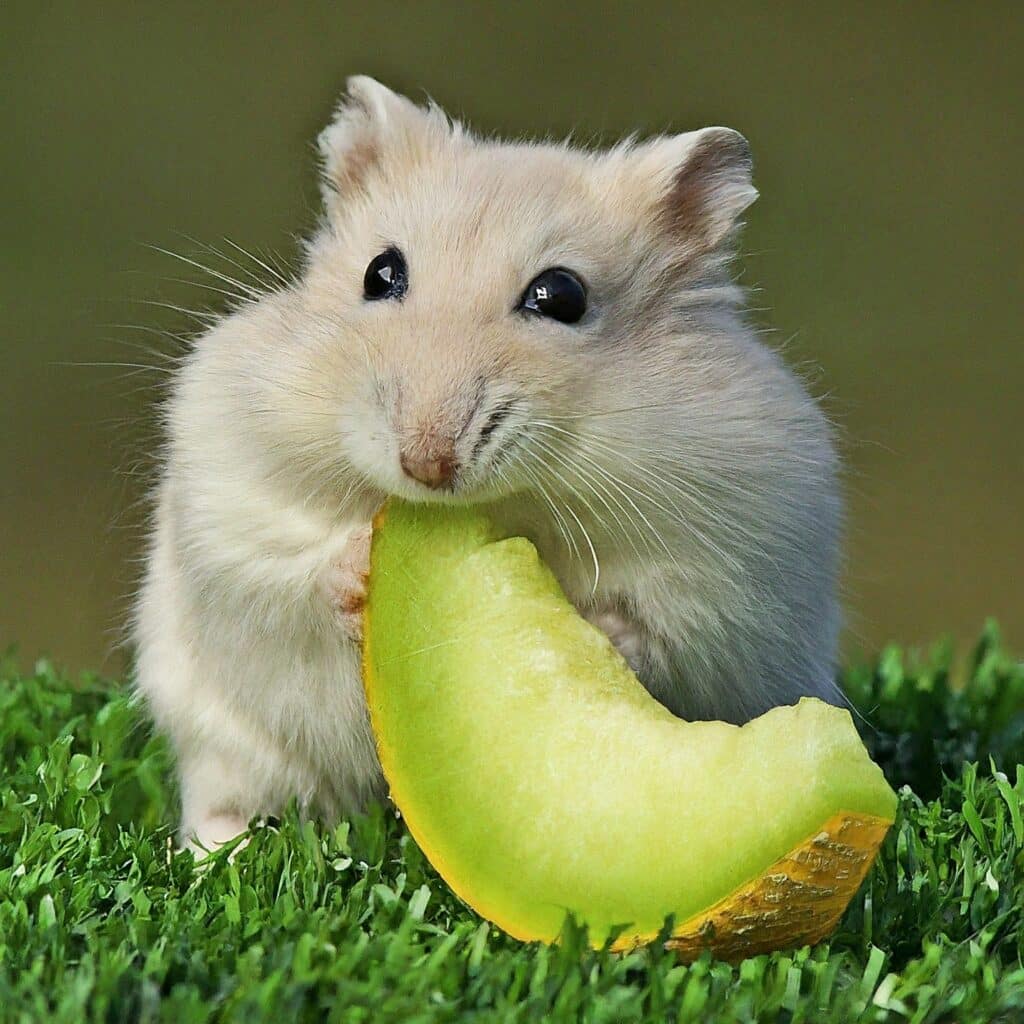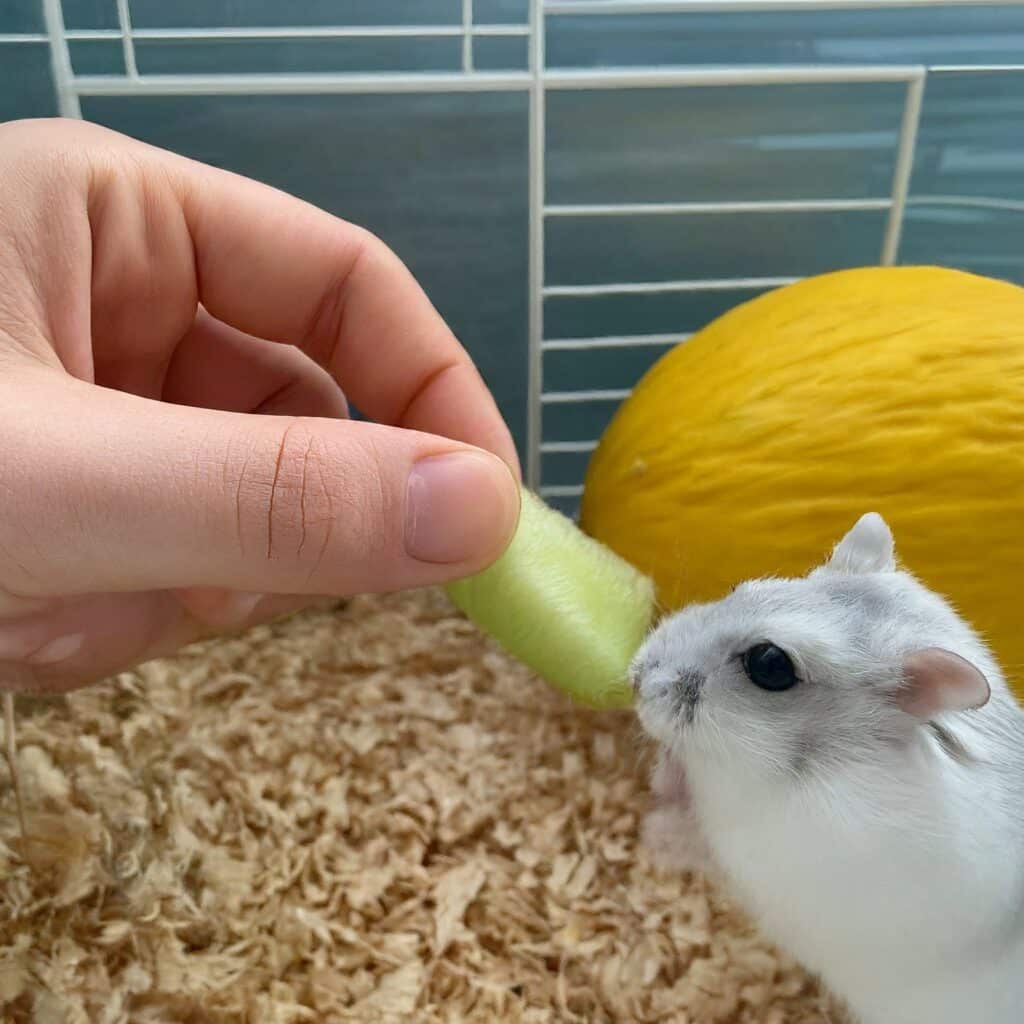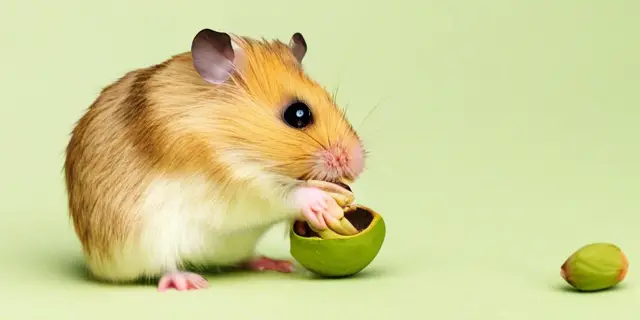Honeydew melon is a popular garden fruit with a sweet, juicy taste. It contains water, antioxidants, vitamins and minerals. This refreshing melon is safe for humans to eat, but can small pets like hamsters also enjoy honeydew?
Can Hamsters Eat Honeydew Melon?
Yes, hamsters can eat honeydew melon in moderation. Honeydew contains beneficial nutrients that are suitable for hamsters. However, it does have high natural sugar content. Therefore, honeydew should only be fed occasionally as a treat.
Here is a quick overview of the pros and cons of feeding honeydew to hamsters:
| Pros | Cons |
|---|---|
| Contains water for hydration | High in natural sugars |
| Provides vitamins C, B6, K | Excessive consumption may upset digestion |
| Antioxidants support immunity | Risk of obesity with excessive intake |
| Nutrients support skin, coat health | Choking risk on rind or seeds |
As the table shows, honeydew does have nutritional value but it must be portion-controlled carefully to avoid adverse effects. Follow the feeding guidelines below for safe occasional honeydew treats.
Nutritional Value of Honeydew for Hamsters

Let’s take a more detailed look at the vitamins, minerals and other beneficial nutrients found in honeydew:
Water Content
Honeydew melon is comprised of about 90% water. This can help keep hamsters hydrated. However, hamsters should still have unlimited access to fresh drinking water as their primary fluid source.
Vitamin C
One cup of honeydew provides over 50% of a hamster’s vitamin C needs for the day. Vitamin C boosts immune function and helps absorb iron.
Vitamin B6
Honeydew contains vitamin B6 which aids metabolism and red blood cell production. A serving of honeydew gives hamsters 10-15% of their recommended B6 intake.
Vitamin K
There is some vitamin K in honeydew, around 5% of a hamster’s daily needs per serving. Vitamin K assists with blood clotting and bone health.
Potassium
Honeydew provides 350-450 mg potassium per cup. Potassium helps regulate fluid balance and supports muscle contractions.
Antioxidants
Honeydew contains carotenoids like beta-carotene which have antioxidant properties. Antioxidants can neutralize harmful free radicals and reduce inflammation.
Fiber
There is 0.5-1 gram of fiber in a thin slice of honeydew. Fiber aids digestion and gut health. However, excess can cause diarrhea.
So while honeydew should only be an occasional treat, it does offer some great health benefits for your hamster in moderation.
Possible Concerns with Feeding Honeydew to Hamsters
While honeydew can be fed to hamsters safely in small amounts, there are some potential risks:
- High natural sugar content – Too much can lead to obesity, diabetes or digestive issues. Limit to only 1-2 small bites.
- Diarrhea – Some hamsters may get loose stool from too much fruit sugar, fiber or unfamiliar foods. Introduce slowly.
- Choking hazard – The rind, seeds or strings can pose a choking risk. Remove before feeding the flesh.
- Bacterial contamination – Pre-cut melon has risks of E. coli, Salmonella or Listeria. Use fresh, clean slices.
- Pesticide exposure – Wash the rind thoroughly before cutting to reduce chemical residues.
- Dehydration – Can occur if honeydew is fed instead of water. Always provide fresh, clean drinking water.
While honeydew fed properly is safe for hamsters, they should eat other water-rich fruits and veggies too. Rotate different produce to limit the risks above while providing variety.
How to Feed Honeydew Melon to Your Hamster

Follow these steps for safely incorporating honeydew melon into your hamster’s diet:
Selecting Honeydew
- Choose ripe, undamaged honeydew with a smooth rind free of mold or soft spots
- Pick honeydews that feel heavy for their size
- Avoid pre-cut melons which have contamination risks
Cleaning and Preparing
- Wash the rind thoroughly under running water before cutting
- Slice off a thin wedge and remove the seeds and rind
- Dice the honeydew flesh into very small cubes no bigger than 1 cm
Portion Size
- Limit honeydew to only 1-2 small cubes per serving, 1-2 times per week max
- Feed other fruits and veggies too for nutritional balance
Serving
- Place the honeydew cubes into your hamster’s dish for them to find mixed in with their regular food
- Refrigerate leftover melon within 2 hours and use within 3 days
By selecting fresh quality honeydew and properly preparing small bite-sized portions, you can safely let your hamster enjoy this sweet treat.
Best Fruits and Veggies to Swap with Honeydew
While honeydew should only be an occasional treat, here are some healthier alternatives your hamster can enjoy more regularly:
| Fruit/Veggie | Benefits |
|---|---|
| Cucumber | Provides water, lower in sugar |
| Bell peppers | Contains vitamin C without excess sugar |
| Carrots | Nutrients without sweetness, great for teeth |
| Romaine lettuce | Low calorie, hydrating |
| Blueberries | Antioxidants without sweetness |
| Pear | Moderate sugar content |
Aim to feed your hamster a wide variety of fruits and vegetables, focusing on fiber-rich produce that is not overly sweet. Use honeydew only sparingly to add diversity.
General Hamster Diet Guidelines

Use these tips to plan a balanced diet for your hamster:
- Staple diet of a quality hamster kibble or fortified pellet blend
- Small portion of vegetables, leafy greens or other produce daily – about 1-2 tbsp
- Limit fruit due to natural sugars – serve a few small bites, 1-2 times per week
- Sparingly feed crunchy nuts, seeds or whole grains as mix-ins
- Provide a protein source like cooked egg or lean meat 1-2 times weekly
- Remove any fresh produce within 24 hours to prevent spoilage
- Always provide unlimited fresh, clean drinking water
- Do not overfeed – follow package guidelines for portion control
- Avoid sugary human treats, chocolate, caffeine, alcohol
- No dairy products
- Remove any uneaten fresh food nightly
Following these guidelines while also checking for your hamster’s personal tolerances will allow you to safely incorporate nutritious variety like honeydew melon.
Signs Your Hamster Can or Cannot Tolerate Honeydew
Monitor your hamster closely when first feeding honeydew. Signs of tolerance include:
- Readily eating the honeydew without hesitation
- No changes in activity levels, nesting habits or demeanor
- Regular appetite at next feeding time
- Normal urine and stool output, no diarrhea
- No vomiting or regurgitation
Signs that indicate honeydew should be avoided:
- Diarrhea, especially with undigested melon
- Lack of appetite or disinterest after feeding
- Straining to urinate or bloody urine
- Gas, bloating, or a swollen abdomen
- Dehydration from excess fluid loss
- Attempts to bury or avoid the melon
If you notice any negative reactions, stop feeding honeydew and speak with your vet. Some hamsters have individual intolerances.
Can Hamsters Eat Other Melon Types?
Honeydew has a relatively low glycemic index compared to other melons. Other melons like cantaloupe, watermelon, and casaba are safe for hamsters to eat sparingly as a treat. However, they contain even more natural sugar so portion size should be restricted to just a bite or two, 1-2 times monthly.
In summary, most melons provide some nutritional value but are high in sugars. Honeydew is one of the safer options when fed in strict moderation. Focus on feeding your hamster a wide variety of healthier produce like leafy greens, vegetables, and limited fruits. Use melon occasionally for a refreshing sweet treat.





